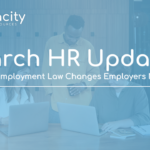Federal HR Updates:
What Employers Need to Know
You asked. We answered.
We’ve received requests to tackle questions related to recent announcements from the Biden Administration and the impact on employers.
Q. Federal HR Updates. COVID and Vaccinations: how does President Biden’s COVID announcement impact employers?
On September 9th, President Biden announced new vaccination and testing requirements impacting employers. The announcement has generated both widespread support and threats to challenge the Executive Order. According to Gallup, roughly six in ten Americans generally approve of the vaccination requirements. However, experts also anticipate that additional States will follow in the footsteps of the Arizona Attorney General, who announced on September 14th that his office is challenging the constitutionality of the COVID-19 vaccine mandate.
Employers with 100+ Employees
According to the Order, employers with 100 or more employees must require its workforce to be fully vaccinated or require any workers who remain unvaccinated to produce a negative test result on at least a weekly basis before coming to work.
Occupational Safety and Health Administration (OSHA) will issue an Emergency Temporary Standard (ETS) to implement this requirement. Employers must provide paid time off for the time it takes for workers to get vaccinated or to recover post-vaccination side effects.
As of the date of this publication, the ETS has not yet been released so stay tuned for news from OSHA. The requirement is expected to impact over 80 million workers in private sector businesses with 100+ employees. Biden officials have announced penalties of up to $14,000 per violation.
Federal Employees and Contractors
The Order will require all federal executive branch workers to be vaccinated and extends this requirement to employees of contractors that do business with the federal government. The Department of Defense, the Department of Veterans Affairs, the Indian Health Service, and the National Institute of Health are in the process of implementing the standard.
On September 24th, the administration announced a December 8th timeline and are urging employers to take steps now to be on track for implementation.
Medicare and Medicaid Participating Health Care Settings
Centers for Medicare & Medicaid Services (CMS) is taking action to require COVID-19 vaccinations for workers in most health care settings that receive Medicare or Medicaid reimbursement, including but not limited to hospitals, dialysis facilities, ambulatory surgical settings, and home health agencies.
This action builds on the vaccination requirement for nursing facilities recently announced by CMS, and will apply to nursing home staff as well as staff in hospitals and other CMS-regulated settings. These requirements are expected to impact approximately 50,000 providers and cover a majority of health care workers across the country.
Reasonable Accommodation
As a reminder, the Equal Employment Opportunity Commission’s (EEOC) guidance requires that covered employers provide reasonable accommodation for employees with disabilities and employees with religious beliefs that conflict with receiving a vaccine. The EEOC recently announced that “long COVID” may be a disability under the Americans with Disabilities Act (ADA). EEOC describes “long COVID” (also sometimes referred to as “long-haulers”) as individuals that continue to experience symptoms months after first being infected, creating a persistent and significant health issue.
Q. Federal HR Updates. When will the Joint Employer Status change take effect?
The Wage and Hour Division of the U.S. Department of Labor (DOL) announced an extension of the recission of the “Joint Employer Status Under the Fair Labor Standards Act” (which took effect on March 16, 2020) to October 5, 2021. In rescinding the March 2020 rule, the Department argued it improperly narrowed the test for vertical joint employment, and conflicted with decades of Department interpretation, the text of the Fair Labor Standards Act, and Congressional intent. Employers impacted by the recission should be prepared for the October 5th timeline.
In a July press release, the DOL explained the importance of the joint employer rule: “Under the FLSA, an employee can have more than one employer for the work they perform. Joint employment applies when – for the purposes of minimum wage and overtime requirements – the department considers two separate companies to be a worker’s employer for the same work. For example, a joint employer relationship could occur where a hotel contracts with a staffing agency to provide cleaning staff, which the hotel directly controls. If the agency and the hotel are joint employers, they are both responsible for worker protections.”
Q. Federal HR Updates. What is the update on the Unemployment Supplement?
The federal emergency unemployment benefits ended on Sept. 6th.
The expanded unemployment benefits authorized in March 2020 to help mitigate pandemic-induced economic distress included a $300-per-week federal supplement to state jobless payments; additional weeks of assistance for long-term unemployed workers; and a special program to provide benefits to people who traditionally don’t qualify for unemployment benefits, such as gig workers and people who are self-employed.
Federal HR Updates: Key Takeaways
With guidance and rules rapidly evolving, it is critical for employers to stay updated on how these changes will impact their employees, operations, and policies. Continue to consult both internal and external experts to navigate the complexities and regulatory requirements.
Originally published in October 2021 Business North.
About the Author
HR thought leader and principal at Audacity HR, Stacy Johnston, provides innovative solutions with a mission to support organizations in understanding and engaging their biggest competitive advantage… their employees. Johnston is a licensed attorney and holds the SHRM-CP and PHR credentials.
HR Resources
Is your Employee Handbook updated and in compliance with new Minnesota law? Read about the changes here.






